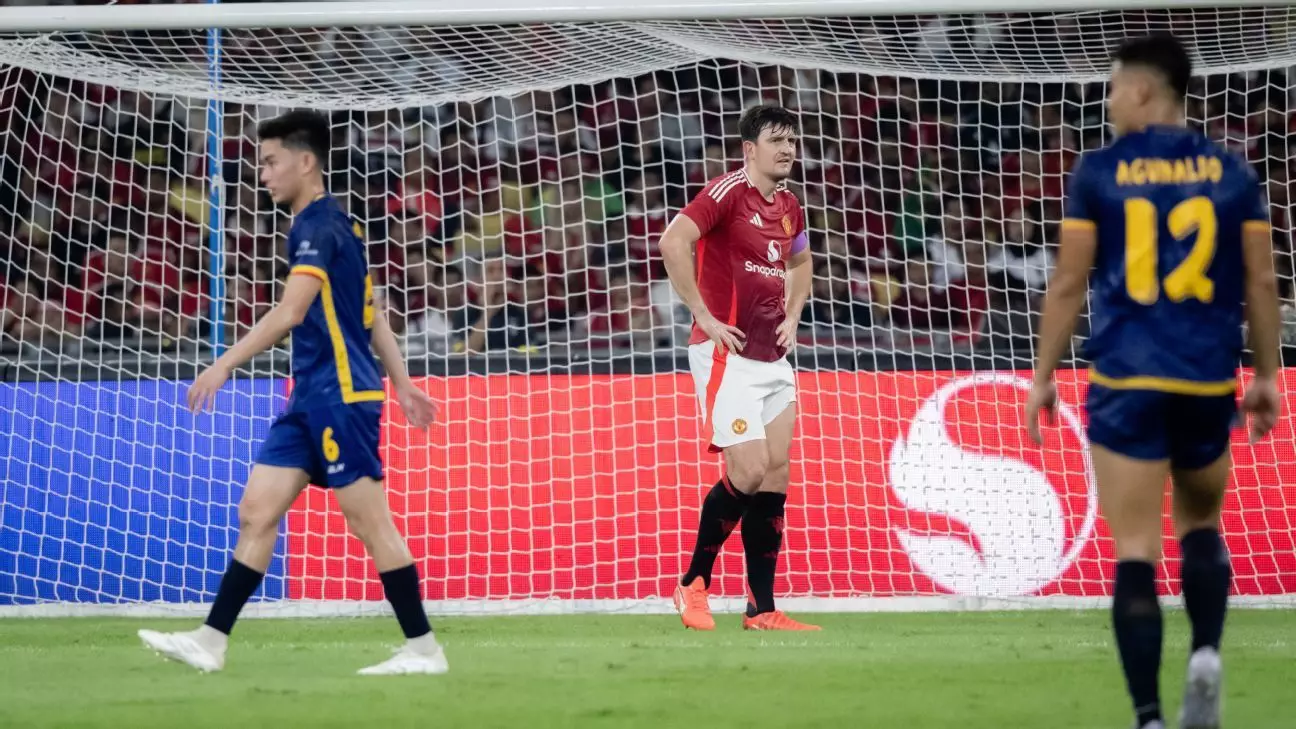In a display that will be etched in the minds of fans and critics alike, Manchester United found themselves engulfed in disappointment as they fell prey to the ASEAN All-Stars in Kuala Lumpur, succumbing to a slender 1-0 defeat. The sound of booing from disenchanted supporters echoed through the Bukit Jalil National Stadium, serving as a grim reminder of the club’s dismal performance throughout the season. This loss not only allows room for introspection but raises serious questions about the direction in which the club is heading. It paints a troubling picture of a once-dominant football institution grappling with its identity amidst a sea of mediocrity.
A Season to Forget
Manchester United’s season has unfolded like a tragic tale, culminating in their lowest ever Premier League finish at 15th place. Hopes for resurgence fizzled out rapidly, with fans clinging to the idea of a fresh start following a lackluster campaign. The squad’s journey to Malaysia, where they played against a team comprising international talents from Southeast Asia, was expected to be a chance for redemption. Instead, it highlighted the gap between the expectations of fans and the reality of the team’s performance. The club’s inability to capitalize on their star players such as André Onana, Harry Maguire, and Bruno Fernandes was painfully evident, as their collective effort fell short once again.
The Manager’s Reflection
Ruben Amorim, who has taken the helm of this beleaguered team, echoed the discontent felt by fans, admitting his culpability for the team’s dismal showing. His honesty is commendable, revealing a level of accountability that is refreshing in a sport often marred by deflection. However, these admissions may not suffice to comfort fans yearning for actual performance and results. Amorim’s comments about respecting the supporters’ feelings reflect an understanding of the passionate connection between the club and its loyal fans. Yet the weight of his words raises an important question: how long can the manager rely on goodwill when results on the pitch do not improve?
The Need for Revitalization
The post-match interview revealed an unsettling acknowledgment from Amorim—that his team must turn their training drills into match-ready vigor. For a club as storied as Manchester United, this admission hits hard. The apparent lack of urgency and intensity displayed on the field lacks the essence of a winning mentality. What the club desperately needs is not just tactical adjustments but a holistic revision of its culture—one that emphasizes resilience, grit, and an unyielding desire to win.
While the club’s CEO Omar Berrada speaks of a clear plan for squad improvement, the roadmap must reflect the urgency of the situation. A string of poor performances cannot be brushed aside with mere promises of change. Berrada’s comments about preparation indicate that management acknowledges the pressing need for reinforcements, which is a step in the right direction. However, the commitment to fix the existing issues must translate into decisive actions on the transfer market.
Looking Forward: A Pivotal Game Ahead
As Manchester United gears up for their last match of the season against the national team of Hong Kong, anticipation is tinged with skepticism. Will the players rise to the occasion and offer a glimpse of what the future may hold? Or will they falter once more, further fueling the unrest among the fanbase?
Regardless of what happens next, the fans’ reaction in Malaysia underlines a pivotal moment in United’s tumultuous journey. Their collective disappointment is a clarion call for change that must not be ignored. As the summer beckons with opportunities for revitalization, the club finds itself at a crucial crossroads—one that will decide whether Manchester United will reclaim its former glory or continue down a path of obscurity. The time for action is now; there can be no more excuses or missed opportunities. The club must rise to the occasion, or risk being left behind in the annals of Premier League history.

Leave a Reply